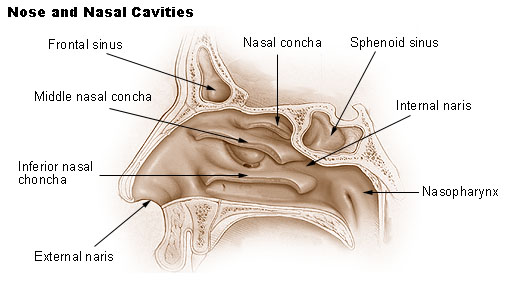There is little scientific evidence to support the current practice of using oral glucocorticosteroids and antibiotics to treat patients with chronic rhinosinusitis and nasal polyps.
In a double-blind, placebo-controlled, multicenter trial, 47 patients with bilateral nasal polyps randomly assigned to receive for 20 days either:
- methylprednisolone in decreasing doses (32-8 mg once daily)
- doxycycline (200 mg on the first day, followed by 100 mg once daily)
- placebo

Nose and nasal cavities. Image source: Wikipedia, public domain.
Methylprednisolone and doxycycline each significantly decreased nasal polyp size compared with placebo. The effect of methylprednisolone was maximal at week 3 and lasted until week 8, whereas the effect of doxycycline was moderate but present for 12 weeks.
The study showed a significant effect of oral methylprednisolone and doxycycline on size of nasal polyps, nasal symptoms, and mucosal and systemic markers of inflammation.
References:
Oral steroids and doxycycline: two different approaches to treat nasal polyps. Van Zele T, Gevaert P, Holtappels G, Beule A, Wormald PJ, Mayr S, Hens G, Hellings P, Ebbens FA, Fokkens W, Van Cauwenberge P, Bachert C. J Allergy Clin Immunol. 2010 May;125(5):1069-1076.e4.
In a double-blind, placebo-controlled, multicenter trial, 47 patients with bilateral nasal polyps randomly assigned to receive for 20 days either:
- methylprednisolone in decreasing doses (32-8 mg once daily)
- doxycycline (200 mg on the first day, followed by 100 mg once daily)
- placebo

Nose and nasal cavities. Image source: Wikipedia, public domain.
Methylprednisolone and doxycycline each significantly decreased nasal polyp size compared with placebo. The effect of methylprednisolone was maximal at week 3 and lasted until week 8, whereas the effect of doxycycline was moderate but present for 12 weeks.
The study showed a significant effect of oral methylprednisolone and doxycycline on size of nasal polyps, nasal symptoms, and mucosal and systemic markers of inflammation.
References:
Oral steroids and doxycycline: two different approaches to treat nasal polyps. Van Zele T, Gevaert P, Holtappels G, Beule A, Wormald PJ, Mayr S, Hens G, Hellings P, Ebbens FA, Fokkens W, Van Cauwenberge P, Bachert C. J Allergy Clin Immunol. 2010 May;125(5):1069-1076.e4.
Nucleotide-binding oligomerization domain (NOD)-like receptors (NLRs) have a potential role in chronic rhinosinusitis/polyps http://goo.gl/QAS4r
Intranasal corticosteroids are effective in reducing nasal polyp size and relieving nasal symptoms http://goo.gl/5gcO6
Lack of efficacy of long-term, low-dose azithromycin in chronic sinusitis (3 months) http://bit.ly/o6EEuN
Mepolizumab, a humanized anti-IL-5 mAb, as a treatment option for severe nasal polyposis. JACI, 2011.
Intranasal antinuclear autoantibodies (ANA) in patients with chronic rhinosinusitis with nasal polyps. JACI, 2011.
Lack of efficacy of long-term, low-dose azithromycin in chronic sinusitis (3 months) http://bit.ly/o6EEuN
Mepolizumab, a humanized anti-IL-5 mAb, as a treatment option for severe nasal polyposis. JACI, 2011.
Intranasal antinuclear autoantibodies (ANA) in patients with chronic rhinosinusitis with nasal polyps. JACI, 2011.